In this Salome, it’s the prophet who strips
NewsFrom Frankfurt’s revival of Richard Strauss’s calculated shocker:
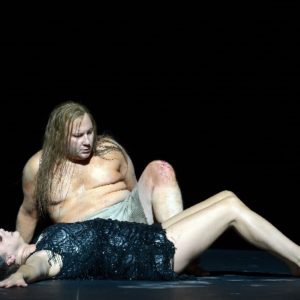
Ambur Braid (Salome), Nicholas Brownlee (Jochanaan).
Photo: Barbara Aumüller/Oper Frankfurt
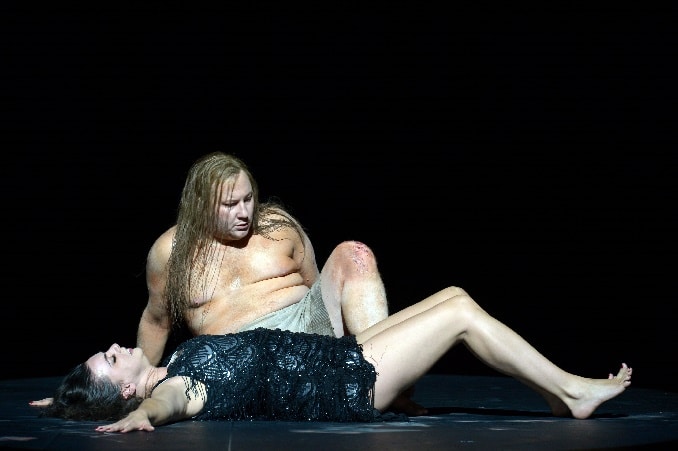
From Frankfurt’s revival of Richard Strauss’s calculated shocker:

Ambur Braid (Salome), Nicholas Brownlee (Jochanaan).
Photo: Barbara Aumüller/Oper Frankfurt
From Georgina McGrath: I’m very sorry to share…
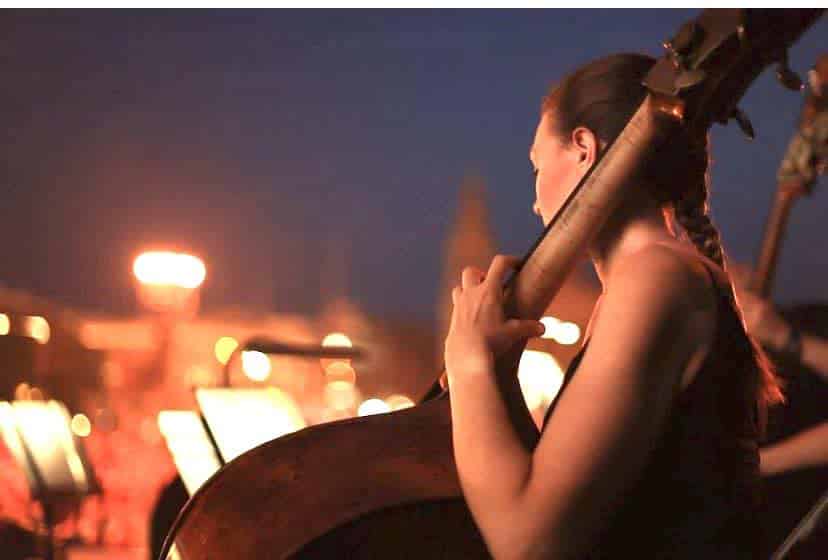
We have been notified of the death this…
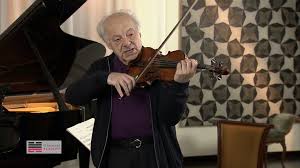
From the general manager’s self-admiring Sunday sermon in…

The press service of the Mariinsky Theater has…
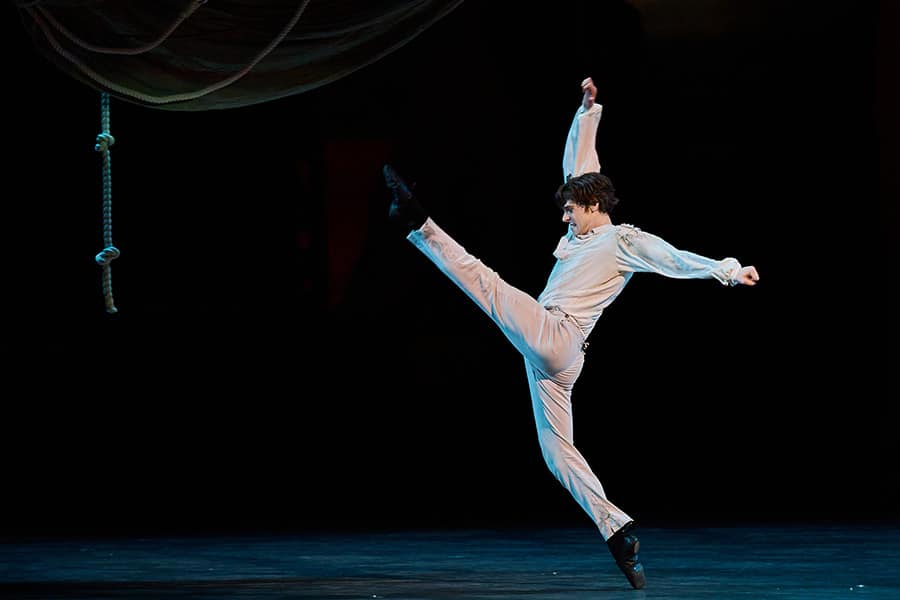
Session expired
Please log in again. The login page will open in a new tab. After logging in you can close it and return to this page.
Many Regietheater directors find Salome not morbid enough, they think audiences have got accustomed to it since the early 1900s – as if it is always the same audience – and add some of their own sick morbidity to the work. They forget that such strategy distracts from the music and lowers the level of the production.
The best rendering, visually, of Salome is to leave as much as possible to the imagination so that the music can get its full effect. Then it is a real shocker.
Well, listen to a CD and you get what you want.
I find I actually prefer that, most of the time, for the same reason that I [almost] always prefer the book to the movie.
I get to decide what the characters look like; I even have the choice not to decide what they look like. Ditto for their homes, clothes, how they move, etc. If I want to listen to Caballé and visualize a starving seamstress, for exmple, I am free to do so.
Yes, what I often do when going to a Salome production: I copy my CD of the work on my portable thing, and in the auditorium I close my eyes and listen to my trusted CD with eyes closed.
The best performance of Salome I ever saw was on film, decades ago, with Teresa Stratas. She didn’t need regietheater or any other such bullshit.
She was one of the greats.
Yes, a calculated shocker that never shocked. Oscar Wilde, whose play forms the basis of the libretto, had very good reasons for studying what he referred to as “poison,” his term for unaccepted forms of erotic temptation in Victorian England. He even went to prison for it. Strauss simply did not have such sincere motivations. The Germans, to their credit, have never been particularly puritanical, and even during Strauss’s life, most didn’t really give a damn about what consenting adults did in their own privacy. Without Wilde’s “poison,” Salome is empty, an operatic gesture in the worst sense of the word. There was indeed a kind of sado-anal necrophilia in the darker regions of German culture at that time, but Salome doesn’t capture it. The work was, and is, a superficially calculated gesture that could only exist in the utterly stodgy world of opera.
I also wonder if it isn’t time we begin to think of at least some classical music as actually a form of ethnic music. Why do we think of the Germanic character of classical music as some sort of neutral norm? The score for Salome is so utterly Austro-Bavarian that the piece would only be plausible if Salome were wearing a Dirndl, though I suspect a clever director like Sellers could figure out some nifty way of not having Herod in Lederhosen.
The music is astounding, but theatrically speaking, we don’t see too much more than caricatures in Roman costumes chromatically bellowing over the Alpine Symphony. Even by the standards of opera, there are no real humans in the work, just one-dimensional, quasi-Biblical figures. Especially in the climatic (sic) sections, the work gives no sense of sexuality or horror, but rather programmatic Alpine tableaus: glaciers, raging streams, a stag in a meadow, timber houses with geranium flower boxes, et al. At one point, even an embarrassed Till seems to stumble onto the wrong set. Even allowing for theatrical conventions, Strauss’s Salome is far, far too beery for either ancient Israel or conflicts with British Puritanism. A calculated shocker indeed. Just the thing for the world of opera.
I bet William Osborne is REALLLLLY fun to hang out with……..
Nail on head.
Head on plate.
There are very few operas where the music sounds like the setting — maybe only the ones set in the present day and location of the composer.
Actually, trying to think of one is not so easy. It might be a fun game though, for those of us who have time.
Oh, here’s one: “Trouble in Tahiti” (and “A Quiet Place”) — a mid-20th Century American opera set in mid-20th Century America.
Anyone else have any ideas? I’m sure there are plenty of examples out there…
Oh dear!
It seems to me that beheading prophets when they don’t surrender to the tempations of a hysterical adolescent should rightly be considered a taboo, both in England as on the continent and everywhere else where prophets dwell around.
There are many points Mr Osborne mentions which would invite for devastating critique, but I will restrict myself this time for the point of whether Strauss’ music is neutrally classical or Bavarian-German. The classical tradition with its roots in the German-Austro area is neutral indeed, and any more specifically associations are mere personal fingerprints of the composer, like the boisterous joviality and occasional rudeness of Beethoven is his Rheinland touch, and the Viennese suave agility Mozart’s, and the slightly peasant turns of Haydn reflect his upbringing in the Austrina hinterlands. But that does not in the least diminsh the universality of the style which can be absorbed by other composers in other places easily. It is a certain complexity and profundity which characterizes the tradition, and is flexible enough to include extremities as in Strauss’ Salome and Elektra and early Schoenberg and Berg and Hindemith. The style is not an ethnically-defined one, as is proven by Chaikovsky, Delius, Franck, Saint-Saens, Glazunow, Elgar.
Also the style is pure coincidentally German/Austrian, because its roots were in France and Italy as much as in Germany. It is thanks to three very individual composers, Haydn, Mozart and Beethoven, that it turned out to be German/Austrian. It is a very individual achievement and not a product of a locality. Mind you, Vienna at the time was teeming with foreign musicians and composers, as was Paris (where Mozart was not recognized and made a fatefull and pointless trip to).
The Germans have never been puritanical? You’ve GOT to be kidding me!!! Have you ever heard of World War 2? It didn’t come from outer space.
In a “Sellers” (sic) production Salome would be a Black man, Jochanaan would be Asian, and Herodes and Herodias, sung by countertenors, would be a lesbian couple. The only white singers would be the Nazarenes and the slave.
And it would be set in a sweatshop in Wuhan.
I want to know who thought this was a good look for Jonny Boy and who was the other person who said “YES”.
That would have been a missed opportunity from my perspective: I’d much rather see Ambur Braid. I don’t suppose they gave refunds to disappointed audience members.
Note to opera singers: Unless you have a great body, and most of you don’t, please don’t strip just because the director tells you to, no one thinks you look good, no one thinks you’re being courageous.
Of course today directors cannot allow the sensuality to come upon us by the music – just ram it into our face
And in the case of this particular production, “ram” is just about the right description for Jokanaan …
In this production, Jokanaan does not strip – at least he didn’t during the opening run in March 2020. Which begs the question: has Barrie changed the stage directions or has Noman run out of clickbait headlines?